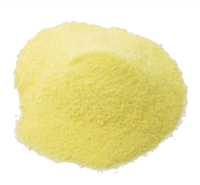Coenzyme Q10
 Overview
Overview
Coenzyme Q10 is also known to many people as ubiquinone because it is ubiquitous – it exists virtually everywhere in the body. CoQ10 behaves like a vitamin because it serves as a catalyst in certain reactions, and it is not considered to be a “true” vitamin because it is synthesized in human cells. Sufficient amounts of CoQ10 are necessary for a person to enjoy optimum health. Some people – particularly those with heart disease or taking certain cholesterol-lowering drugs – are at a high risk for CoQ10 depletion or deficiency, sometimes with tragic results.
Chemical Components
In 1957, researchers at the University of Wisconsin discovered a substance in beef hearts that seemed to be basic for making energy in all living cells. This ingredient was quinone, a substance found in all living animals and plants which use oxygen.
Uses
CoQ10 is used for energy production as noted above. It acts as a catalyst in the chain of chemical reactions that create a substance known as adenosine triphosphate (ATP), which is a compound that yields the energy needed by the cells in order to function properly. Thus, it is easy to see why low concentrations of this important substance are detrimental to overall health and well being. CoQ10 is most abundant in the organs which require a large supply of energy, such as the immune system, the heart and the liver.
Like many other “real” vitamins, CoQ10 is an antioxidant. It is rather similar in structure to vitamin E, which is another antioxidant. CoQ10 scavenges for harmful free radicals, and may help to prevent cell damage which is caused by a variety of conditions.
Much of current research regarding CoQ10 is based around cardiovascular disease, since this nutrient is most concentrated in the heart. A number of clinical studies suggest that CoQ10 supplements benefit people with angina with no side effects. Other studies have shown CoQ10 helps such patients to exercise for longer periods of time. Some research has even shown CoQ10 to be an effective drug therapy for angina by itself. Other research has shown that CoQ10 given to patients during open-heart surgery and possibly transplantation can help reduce the tissue damage which results from open-heart surgery.
In Japan, CoQ10 studies have shown it to be beneficial to patients with congestive heart failure. People with cardiomyopathy had extremely low levels of CoQ10. Therefore, the Japanese government has approved the use of CoQ10 in the treatment of this condition. Other studies have confirmed that CoQ10 is effective at alleviating the symptoms of congestive heart failure and improving the overall quality of life of the patients with this disease. A similar study showed that heart patients who were expected to die within a short time actually improved using CoQ10.
Studies of animals and humans also suggest that CoQ10 may decrease irregular heartbeat (arrthyhmia), even in patients whose arrhythmia is caused by psychotropic drugs. CoQ10 may also help to improve patients with mitral valve prolapsed.
Some cancer patients may also benefit from the use of CoQ10 supplements.
People with chronic fatigue syndrome and immune dysfunctions can also benefit from CoQ10. Supplementation has shown to improve the symptoms associated with this condition, to include sleep disturbances, headaches, post exercise fatigue and chronic fatigue.
Levels of CoQ10 tend to decrease with age, so supplements may be in order for the elderly.
Dosage
CoQ10 is mostly found in beef hearts, chicken hearts and other hearts. It can also be found in peanuts, sardines and spinach. Many plants contain a form of CoQ10 but these do not act in the same way as the CoQ10 which is found in animal foods.
In supplement form, patients are given anywhere from 50 to 1,200 milligrams. There is no established recommended daily amount for CoQ10.
Adverse Reactions
Adverse reactions to this substance can include minor gastrointestinal upset, nausea, diarrhea and loss of appetite.
References
- Bratman, S. The Alternative Medicine Ratings Guide: an expert panel rates the best treatments for over 80 conditions, Prima Health A Division of Prima Publishing (1998)
- Brown, L. Alternative Medicine, NTC/Contemporary Publishing (1999)
- Deepak Chopra, M.D. Alternative Medicine: The Definitive Guide, Celestial Arts (2002)
- Duke, J. The Green Pharmacy: Herbal remedies for common diseases and conditions from the world's foremost authority on healing herbs,Rodale Limited (2003)
- Nancy Allison. The Illustrated Encyclopedia of Body-Mind Disciplines, The Rosen Publishing Group (1999)
- Servan-Schreiber, D. The Encyclopedia of New Medicine: Conventional & Alternative Medicine For All Ages, Rodale International Limited (2006)
Posted in Coenzyme Q10
Ask a Question Or Join a Discussion


